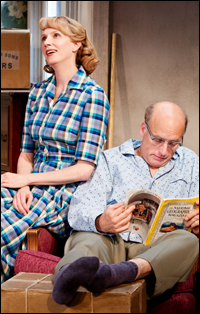
*
The roots of racial and economic changes in an American neighborhood are at the center of Bruce Norris' Tony Award-nominated, Pulitzer Prize-winning play Clybourne Park. Obie Award-winning director Pam MacKinnon — a frequent collaborator with Edward Albee on such works as Occupant, Peter and Jerry and Steppenwolf's Broadway-bound Who's Afraid of Virginia Woolf? — was at the helm for the satiric comedy-drama's 2010 world premiere at Playwrights Horizons. She repeats her work for the current Broadway run of Clybourne Park, which reunites the earlier company at the Walter Kerr Theatre. (The production was reconstituted at Mark Taper Forum in Los Angeles earlier this year, prior to Broadway. She earned her first Tony nomination for Direction for the project). The uniquely structured play, borrowing a situation from the Lorraine Hansberry classic A Raisin in the Sun, is set in the same house in two time periods — in Act One, it's 1959 and a white homeowner is selling his house to a black family, much to the horror of the white neighbors; in Act Two, it's 2009, and, following decades of economic decline in what has become an African-American neighborhood, the house is being bought by white gentrifiers.
I'm finding new things every time I see Clybourne Park.
Pam MacKinnon: Me, too.
That's the mark of literature, I guess.
PM: Yep. It's a big play.
| |
 |
|
| Christina Kirk and Frank Wood in Act One of Clybourne Park. | ||
| photo by Nathan Johnson |
PM: I think they handed over this task of selling this house as quickly as possible: "Just do it!" They handed it over to, probably, a pretty shady guy, Ted Driscoll, who probably sold it on contract, and he is probably making some money — it's slumlordy kind of stuff. [Russ] was, like, "I wash my hands." I think we should take that at face value.
Did you and the cast have discussions about your personal experiences with race, real estate, communities and history when you were first attacking the play Off-Broadway in 2010?
PM: We had them in dribs and drabs. Putting it up the first time, we did talk about personal things, about people recognizing, as adults, "Ohhhh, my family moved from the inner-city of Boston to the suburbs at a certain juncture when I was five. It was probably because of the schools…" Or, for instance, [2012 Tony nominated actor] Jeremy [Shamos] lives in a certain part Prospect Heights [in Brooklyn] now, and he knows that he's a gentrifier. But our rehearsal process was more about get those lines in your head and we are gonna stage some stuff. [Laughs.]
In some respect, we had more [discussion] putting it up for Los Angeles and Broadway than we did at Playwrights Horizons, simply because time was of the essence [in 2010]. During the first go-round, it was very much about text. It was very much about being in a rehearsal hall, having two-and-a-half weeks, getting a shape of this big, big play out there. The second go-round [at Center Theatre Group's Mark Taper Forum in L.A.], we had already done that. We had a skeleton that worked; we knew that it worked, but now we got to dig in and have a lot of those discussions.
Do you like table work as a director — discussion of language and text?
PM: Yeah, absolutely. I do a lot of Albee. Norris also has that: It's all in the language.
You direct both revivals and new works: contemporary plays by Itamar Moses and Norris, plus classics by Albee or Horton Foote, like the three Foote one-acts you're doing this summer for Primary Stages. If pushed, could you say you prefer new work over older work?
PM: I love them both. But I guess new work is more of my passion because I love sitting side by side with a writer and, at times, being able to ask, "What's your intent? I want to obey that. Tell me!" To have the text still be in flux is really, really exciting.
Are you a prescriptive director when working with playwrights — saying "it should be this…"?
PM: [After a pause.] I ask questions. And I think that's true of how I work with actors, as well. I might have a really strong notion going in, but I'm happy to turn it over if something better comes along.
(Kenneth Jones is managing editor of Playbill.com. Follow him on Twitter @PlaybillKenneth.)
View highlights from Clybourne Park:










